Can you tell me about Aitana’s early love for football? It seems like it was a natural interest for her, as she started playing with boys at her school when she was around six or seven years old, and she was also playing basketball. This passion for football was not influenced by her family, as they were not particularly focused on the sport, but she was born with the drive to play it.
At the age of 14, you became a member of Barça. Can you tell me about that experience? At the time, I was playing football on the school grounds and I requested to join my town’s football team, Club Deportiu Ribes. I spent four to five years there before joining another team, Club de Futbol Cubelles. During my time there, I was the only female player on the team. However, in Catalonia, there is a rule that cadetes (14-15 years old) cannot play in mixed teams. This meant that I had to stop playing with the boys, but I was fortunate enough to be signed by Barcelona at that time.
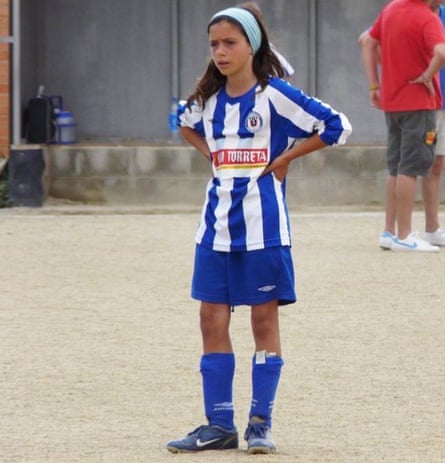
Please view the image in fullscreen.
What was your experience like when you joined that large club at a young age? It had always been a dream of mine to play for Barcelona, but I didn’t think it was ever possible. I was coming to the end of my year at Cubelles, knowing it would be my last year playing with boys and that I would have to switch to playing with girls next year. Then, out of the blue, I received a fax from Barcelona asking if I would like to attend tryouts.
The trials involved more than just completing exercises. It was a requirement to fully participate in my age group and experience their training methods. I even participated in a friendly tournament with them. As someone who had only played with boys for many years, playing with girls was a completely new experience. It brought about a significant shift in my daily routine and how I interacted with my fellow teammates.
Interacting with boys, there was oftentimes a sense of separation. Not all of them were open to the idea of having a girl on their team who performed just as skillfully or even better than them. Moreover, they may not have been accustomed to my personality. The initial years at Barcelona were challenging due to the shift to playing with female peers, but it brought a greater sense of equality among us. We all had faced difficulties throughout our development. As girls, we also faced inadequate living conditions and even more challenges in the realm of football. Looking back, I find it intriguing to remember this transition, as it was no easy feat.
What was your aim during that period of your life? When I first came to Barcelona, I didn’t have a specific end goal in mind because it seemed unattainable at the time. Professional women’s football didn’t exist, even at Barcelona. I thought I would only be there for a few years before possibly going to university and playing in the United States. I had even registered to take exams to potentially transfer to American universities and was in talks with the University of Oregon. After being with Barcelona for four to five years without much progress, I received a call-up to join the first team at that moment.
My mindset has always defined me. I have never missed a training or a game. It is my mentality that has been consistent and has largely contributed to my success as a football player. Talent and hard work are important, but without the willingness to sacrifice, persevere, and constantly strive for improvement, I would not be the person I am today.
Is there a specific memory or lesson from those years that has stayed with you? I have discovered that having resilience, staying motivated, and consistently putting in effort has its rewards. It may not always be easy, but it’s important to acknowledge that challenging moments are necessary for growth and development. Instead of giving up when faced with difficulties, approach them as opportunities to improve and keep moving forward.
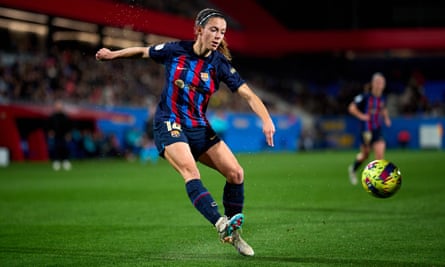
Display image in full screen.
You experienced two significant transitions in your football journey: first from playing with boys to girls, and then from girls’ to women’s teams. How did you feel when you joined the first team? It was definitely challenging in my first year, as I went from being a key player and playing every minute in my academy years, to just being another player on the team with limited playing time. Going from being a young girl to being surrounded by women and having a new role was difficult for me to adjust to. There were times when I struggled to be patient, as my ambition and desire for more were to blame. My first three years with the first team were not enjoyable, largely due to these challenges.
I was aware that I could have had more chances than I was receiving. However, with hindsight, I believe I made significant advancements each year. The challenges I faced ultimately shaped me into the player I am today and were crucial to my growth.
What was your subsequent goal that you established for yourself? Upon joining the first team, it was difficult to have the goal of winning the Champions League as the team was still growing and not yet on par with the top teams in Europe. This goal came later on when we truly devoted our attention to it. We put in a lot of effort, particularly in improving our physical game which we believed was our weakest area. And through that, we created the possibility of joining the ranks of the best.
In the beginning, my goal was to establish myself as a valuable member of the team and become a key player. I didn’t want to blend in as just another player. At times, I played on the sides without a defined position. My desire was to excel in a specific role and be an integral player. I believed that my skills and abilities were best suited for the midfield position. My aim was to consistently prove to the team that I deserved a spot in the lineup.
When was the turning point for you, when did you feel like you had a defined role within the team? It was in 2021 when we won the Champions League in Gothenburg. It wasn’t until my first year when I felt like I made significant progress and my contributions were recognized by the team. Although I had already been playing a lot and starting frequently the year before, my position as a starter was not yet fully established. Since then, I have consistently maintained a high level of performance. It took a total of eight years to reach this point.
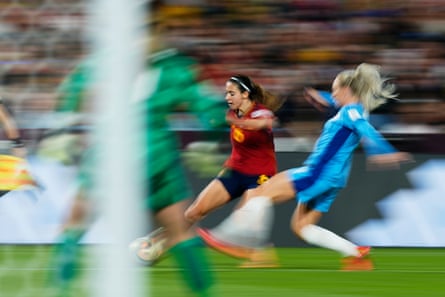
Show image on full screen.
When you reflect on your career, what comes to mind? I acknowledge that I have not been handed anything and have put in a lot of effort to get where I am today. My father and I used to take public transportation late at night after training, often getting home at 1am. I would have to leave training quickly to catch the train. I didn’t even have time to shower at the facility. While there were tough times, my persistence has ultimately paid off. As I consider my current achievements, I am aware that they are not the result of luck, but rather the result of years of hard work.
Bypass the newsletter advertisement.
after newsletter promotion
You have achieved nearly all that you possibly can: a victory in the World Cup, the Champions League, the league, and the cup. What comes next? It is accurate to say that, at 26 years old, I have a respectable list of achievements, but I am still determined for more. The day that I lose my drive and desire is the day I will retire from playing football professionally. Currently, I am still fueled by that passion that motivates me to compete and train at the highest level on a daily basis. Additionally, I have yet to secure a European Championship or Olympic medal. There are still goals to be reached.
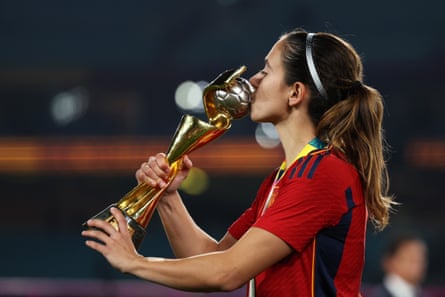
How has the before and after of the World Cup been for you? I don’t owe it all to the World Cup. It was an amazing year on both club and national team level and that has made an impact on a social level; we’ve reached more households. Of course, after our achievements your name is said more often and you’re more well-known on a national and international level. This all helps, winning always helps.
I consistently acknowledge and appreciate the contributions from all members involved. Our teams have achieved great success this year, and as a result, I have been nominated for and received awards. This has marked a significant shift in my recognition and reputation. However, I continue to approach life in the same manner and nothing has changed in my daily routines.
What is your emotional response to being recognized and appreciated for your football talents? Knowing that I am admired by many people is rewarding. That’s why I strive to not only excel on the field, but also be acknowledged for my actions off the field. This is important to me. I believe that when someone idolizes a player, they see the whole person, not just their performances on the field. This brings great satisfaction and is something I prioritize. Ultimately, when my career is over, the awards and titles I have achieved will be significant, but the knowledge that I have brought happiness to many people will be the most fulfilling aspect for me.
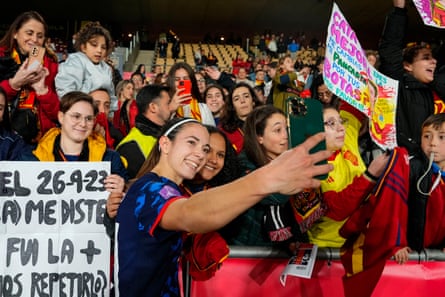
How has it been for you to play a vital role in the development of Spanish football? I have been fortunate to witness the growth of women’s football in recent years. While I have seen the beginning, I cannot say it is the end as there is still much room for improvement. In a short period, our circumstances and resources have drastically transformed.
Is winning also beneficial in terms of gaining better circumstances? I must acknowledge Barcelona for being an exceptional and innovative club, as they have truly stood behind and had faith in us becoming professional footballers. Their provision of all the necessary resources has allowed us, the players, to thrive under the best circumstances. This was something that was once unimaginable.
How would you like to be remembered at the end of your career? Primarily, I hope to be remembered as a talented and inspiring football player who touched many lives. Additionally, I strive for a healthy balance in my life, valuing my connection with fans off the field just as much as my success on the field. I believe it is important to stay connected with fans and show appreciation for their support, as they are an integral part of our team’s accomplishments, such as selling out Camp Nou. Ultimately, I hope to be remembered not only for my contributions to the sport but also for making a positive impact in society, encouraging more attention and recognition for women’s football.
Source: theguardian.com


